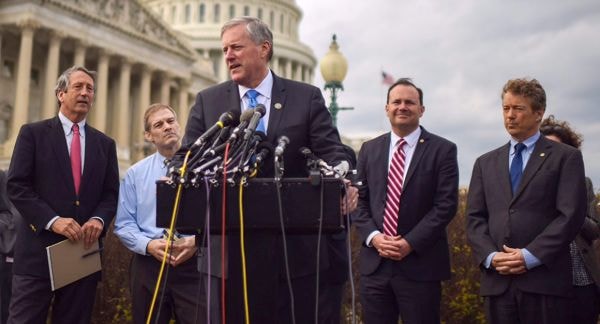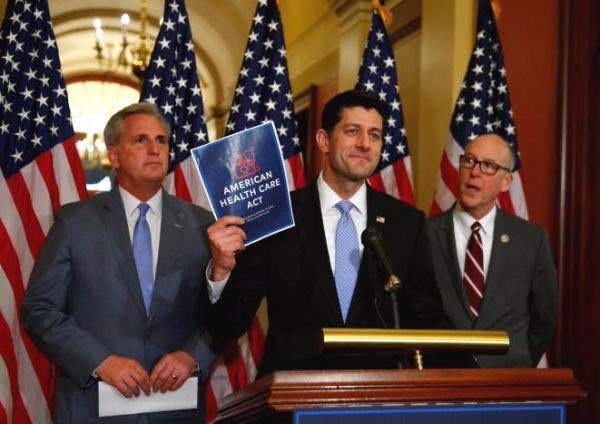US Health Care Act: Trump's First Legislative Test
(Baonghean) - After the complaints and fierce protests against the Obamacare Affordable Care Program, America still has not found a more viable alternative.
Different burdens
 |
| Republican Congressman Mark Meadows, Chairman of the Freedom Caucus - a group that campaigns against the ACA, at a press conference on March 7. Photo: Reuters |
Nearly two months after the United States elected a new President with a pledge to repeal Obamacare, the first draft of a replacement program has been released to Congress. On March 6, House Republicans introduced a bill aimed at eliminating one of former President Barack Obama's greatest legacies.
The new bill, known as the American Health Care Act (ACA), eliminates the tax and subsidy provisions of Obamacare, as well as the insurance obligations of employers and employees.
The three main pillars of the new text are allowing people under 26 to continue to receive benefits on their parents' health insurance plans; allowing states to offer Medicaid health care programs to support adults identified as low-income.
In addition, the bill would establish insurance exchanges and provide tax credits to help low- and middle-income earners afford individual health insurance plans sold on the US health insurance marketplace.
So, the promise made to the voters by Republican lawmakers, and by President Donald Trump, has been fulfilled: to introduce a replacement for Obamacare. But whether it will be accepted and passed is a completely different story.
Less than a day later, conservative Republicans warned that the new bill would not easily win in Congress, because it was too similar to Obamacare.
They argue that the ACA bill has eliminated conservative fiscal principles by maintaining government subsidies in the Obamacare program under the guise of "refundable tax credits" for individual health insurance buyers.
Senator Rand Paul called the ACA bill a "watered-down version of Obamacare" and therefore difficult for conservative members to accept.
This congressman even called the appearance of ACA “the zombie is coming back”. And Senator Mike Lee doubted that this new bill could help Americans access more affordable health care.
These are just two of the voices of opposition in the US Congress, where conservative consultants and lobby groups are calling for resistance to the new bill. Thus, the ACA bill is not only opposed by the Democrats, but also by a part of the Republican congressmen in the House of Representatives.
 |
| House Speaker Paul Ryan announces ACA to replace Obamacare. Photo: CNBC |
Despite these signs, House Speaker Paul Ryan confidently declared during the announcement ceremony that there was enough support to pass the new bill. “This is just the beginning of the legislative process. We will have 218 votes in favor when this bill comes to a vote. I can guarantee that.”
To bolster his efforts to replace Obamacare, President Trump immediately met with more than 20 Republican congressmen at the White House to discuss the steps. Here, Mr. Trump declared that he "proudly supports this replacement plan," even warning that there would be a "bloodbath" in the 2018 midterm congressional elections if this replacement effort failed.
The ACA has a good chance of passing given that Republicans control the White House and both houses of Congress. However, the bill could still be defeated if opposition groups can get enough Republicans to vote against it.
President Trump's "success - failure"
Since its announcement, the ACA - the bill to realize President Donald Trump's campaign promise - has faced huge challenges from Republicans in the House of Representatives. More importantly, it will determine the mettle of the head of the White House. Trump supporters are worried about this important "threshold".
In fact, the new health care bill is the first legislative test for the president, who has no previous political experience. Past experience shows that Mr. Trump has struggled to deal with the political structure in Washington and has at times shown impatience with the complex and tricky system.
Republicans are worried about Trump’s willingness to cave to critics at any point. Many have raised the possibility that Trump will change his mind if he faces too much criticism, or that he will stray from the agenda before the ACA is passed. All of these risks raise questions about the president’s ability to execute his ambitious agenda.
 |
| Protesters protesting the repeal and replacement of Obamacare outside Republican congressman Darryl Issa's office in Vista, California. Photo: New York Times |
For Republicans, the bill’s future is also a major test. The anger that would ensue if Republicans failed to repeal and replace Obamacare would blow away traditional support. And the failure of a Republican president in the White House could convince many other loyal voters to stay home in the upcoming election.
“Many Americans looking for health insurance on the individual market will find that there is no significant change between the ACA and Obamacare. It is a very bad political move, and more importantly, it is bad policy,” said Michael Needham, CEO of Heritage Action, a Washington-based political advocacy group.
Such pressure from conservatives is a concern for Republicans. Republican leaders, especially in the Senate, cannot afford to lose the support of their lawmakers if they want to pass the bill. Meanwhile, Republican governors are also criticizing the plan because it does not preserve the long-term expansion of Medicaid, which is part of Obamacare. And so, the health records of millions of Americans will be threatened.
Thanh Son
| RELATED NEWS |
|---|



